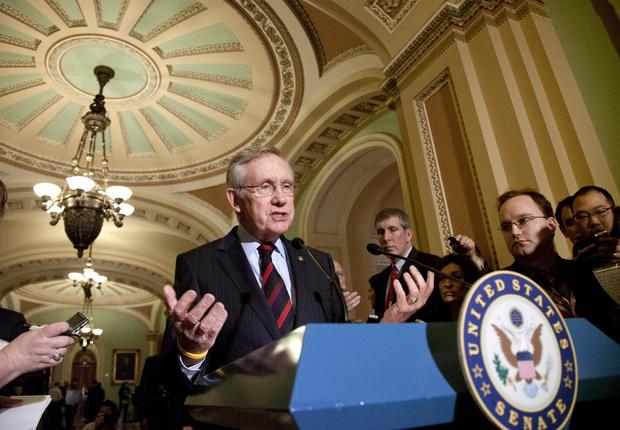Senate to hold formal vote on reversing contraception rule
After initially opposing the idea, Senate Majority Leader Harry Reid agreed Tuesday to allow a vote in the Senate on a measure that would reverse the White House's rule mandating free contraceptive care for workers at religiously-affiliated institutions.
"I have agreed to a vote on contraception," Reid told reporters late Tuesday as he blasted Republicans for pushing to attach "extraneous" provisions to an unrelated transportation bill.
The amendment addressing contraception, sponsored by Missouri Republican Sen. Roy Blunt, would exempt employers from providing health benefits that conflicted with their "beliefs or moral convictions."
President Obama announced Friday that the government will not force religiously-affiliated institutions such as schools, charities and hospitals to directly provide birth control coverage as part of their employees' health care coverage, in the wake of an uproar from religious leaders over the administration's original language surrounding the regulation.
Blunt has blasted the Obama administration for requiring contraceptive coverage for religiously-affiliated employers, and says that even the White House's recent tweak to the rule infringes on faith-based institutions' right to moral objection.
"What has to be protected here is the faith-based rights of conscience. That's what this debate is about," Blunt said Monday.
Sen. Barbara Boxer, a women's health advocate and leading opponent of Blunt's amendment, welcomed the decision to allow a vote, which allows some conservative Democrats to voice their opposition to the White House. The amendment is expected to be rejected.
"Let them bring it to the floor," the California Democrat told MSNBC's Al Sharpton Tuesday night. "We are ready to vote. This is so extreme."
Boxer argued that the language of the amendment is so broad that it would enable employers to exploit the use of moral objection to deny their employees insurance.
"Let's use an example. Let's say somebody believes that medicine doesn't cure anybody of a disease but prayer does," she said. "And then they decide no medicine. No medicine. And under the Blunt amendment, they could do just that."
About 61 percent of Americans support federally-mandated contraception coverage for religiously-affiliated employers; 31 percent oppose such coverage, according to a CBS News/New York Times pollreleased Tuesday.

